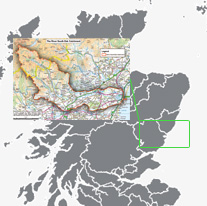Funding is secured for eradication of non-native weeds in the River South Esk Catchment Area
The Esk Rivers and Fisheries Trust on behalf of the River South Esk Catchment Partnership has been awarded £20,000 by the Angus Environment Trust (landfill tax funding) allowing the proposed first phase of implementation of the River South Esk Catchment Management Plan to proceed. The success of this application ensures that match funding previously awarded by Angus Council, Esk Rivers & Fisheries Trust, Scottish Natural Heritage, Cairngorms National Park Authority, and Rural Tayside LEADER is now available, ensuring a further one year delivery of the objectives of the South Esk Catchment Management Plan (SECMP).
The Implementation Phase will begin with the employment of a Project Co-ordinator to implement actions identified in the SECMP and to assist with the first flag-ship project for the partnership, the control of invasive non-native species (INNS project). This will be led by the EskRivers and Fisheries Trust who in July 2009 published a Bio-security Plan which highlights the bio-security issues of the catchment. In 2009 the Trust completed a survey of invasive non-native weeds within the catchment which highlighted the need for an intensive programme of treatment.
The Steering Group have selected the INNS project as a priority as it believes that it is excellent way of engaging stakeholders is the early stages of the implementation of the SECMP. The high-profile project is applicable to many of the plans action cards which include water quality, habitats and species, social and economic factors, water resources, flood management, and river engineering.
The INNS project will bring benefits to the local community within a short timescale with a reduction in the health and safety risk of giant hogweed. Undertaking the project will ensure that the length of South Esk catchment will experience improved access and amenity of the river and its tributaries. A raised awareness of non-native invasive species will help to limit their spread and enhance biodiversity. The removal of invasive non-native species will contribute towards achieving favourable conservation status of the River South Esk Special Area of Conservation.
Other aims of this phase of the project include building better working relationships between agencies, organisations, and the general public with an interest in the South Esk catchment, investigating the social and economic aspects of the catchment, and developing an education programme to promote awareness and understanding of the rivers habitats, species and functions.


